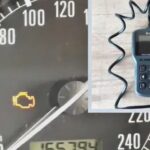Renting a car can be an adventure, but sometimes, unexpected discoveries can add an extra layer of intrigue. Recently, a loose device was found dangling from the OBDII port under the dashboard of a rental car, raising questions about its purpose and function. This article delves into the world of Obd2 Rental devices, exploring their potential uses and the implications for both rental companies and customers.
What is an OBD2 Rental Device?
The device in question was identified as an OBD2 rental tracker, likely manufactured by a company called PowerFleet. It connects to the vehicle’s OBDII port, a standardized interface used for diagnostics and data communication. The device itself had a standard OBDII plug on one end and an eight-pin Molex power connector on the other, suggesting it requires a separate power source.
PowerFleet markets its products to fleet operators, including rental car companies, promising “on-demand visibility, intelligence, and insights.” For rental fleets, the company claims its technology can:
- Increase fuel revenues and reduce fuel costs
- Optimize car return and processing speed
- Provide real-time inventory insights
While these benefits are clear for rental companies, the specific function of the OBD2 rental device found in the car remains unclear. Was it intended to be permanently installed, or was it meant for temporary use by employees to download data after a rental return? The latter seems more probable, with the possibility that an employee simply forgot to remove the device.
Potential Uses of OBD2 Rental Devices
The discovery of a loose OBD2 rental device raises several questions about its intended use and the data it collects. Some possibilities include:
- Vehicle Tracking: Monitoring the location and movement of rental vehicles in real-time. This could be used for asset management, theft recovery, or even to ensure renters stay within agreed-upon geographical boundaries.
- Diagnostics and Maintenance: Tracking vehicle health, identifying potential issues, and scheduling preventative maintenance based on real-time data. This could help rental companies reduce downtime and repair costs.
- Driver Behavior Monitoring: Collecting data on driving habits, such as speed, acceleration, and braking. This information could be used for insurance purposes, driver safety programs, or even to assess fuel efficiency.
- Usage-Based Pricing: Implementing dynamic pricing models based on vehicle usage, mileage, or driving behavior. This could allow rental companies to offer more personalized and competitive pricing options.
Implications for Renters
The use of OBD2 rental devices raises privacy concerns for renters. What data is being collected, how is it being used, and who has access to it? Rental companies should be transparent about their data collection practices and ensure renters understand how their information is being used.
Conclusion
The mystery surrounding the OBD2 rental device highlights the increasing use of technology in the rental car industry. While these technologies offer potential benefits for both companies and customers, it’s crucial to address privacy concerns and ensure transparency in data collection practices. Renters should be informed about the presence and purpose of any tracking devices in their rental vehicles, allowing them to make informed decisions about their rental experience. Further investigation is needed to understand the specific functions and data collection capabilities of this particular OBD2 rental device.

